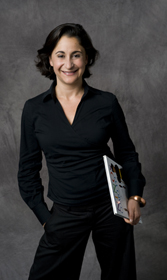Abigail Falik Chosen as Harvard Business School Social Entrepreneurship Fellow
 Abigail Falik
Abigail Falik
BOSTON — Harvard Business School has named Abigail Falik (MBA 2008) the 2009-2010 HBS Social Entrepreneurship Fellow. Falik is founder and CEO of Global Citizen Year (GCY), a nonprofit organization that is building a movement of diverse American high school graduates who will become global change agents in the fight against poverty. The HBS Social Entrepreneurship Fellowship program is designed to support the efforts of recent HBS graduates who are launching social enterprises - nonprofit, for-profit, or hybrid organizations - with a central focus on creating social value. The program provides seed funding support to one recent graduate each year through a $25,000 fellowship. Based in San Francisco, GCY partners with high schools and colleges across the United States and NGOs around the world to create opportunities for young Americans to work as apprentices in Africa, Asia, and Latin America during a "bridge year" between high school and college. "Through our intensive nine-month program we ensure that our Fellows develop an ethic of service, the skills to communicate across languages and cultures, and the ability to provide innovative and effective leadership to address the challenges of the 21st century," said Falik of the program model. "Over time, we aim to create systemic change in how young Americans learn about - and interact in - the world." GCY Fellows receive intensive leadership and communication training focused on social innovation, global systems, and sustainable development, as well as instruction in the language of their host country. They then spend seven months living with a family in a rural community in Africa, Asia, or Latin America, supporting a local NGO offering direct services in education, public health, microfinance, technology, or environmental conservation. Once back in the United States, GCY Fellows share their experiences through presentations at local schools, community exhibitions, and via social media and other web 2.0 tools. Fellows then enter college with a broader perspective and a better understanding of the world and their place in it. Conceptualized by Falik while at Harvard Business School with a team of graduate students from across Harvard and MIT, GCY has since grown to include leading experts in social enterprise, global development, international education and exchange, and higher education. The Social Entrepreneurship Fellowship is designed to fit within the array of already established programs that support HBS students in pursuit of new social ventures - a career path that is increasingly being explored by recent graduates. As an example, since the founding of the Social Enterprise Track of the HBS Business Plan Contest in 2001, nearly one-third of the contest entrants have gone on to pursue some form of implementation of their plan and several have done so through the pursuit of stand-alone social ventures immediately or soon after graduation. "The Harvard MBA curriculum provides students with a variety of learning opportunities that prepare them for future roles in social enterprise," said HBS Professor William Sahlman, one of the faculty co-chairs of the new program. Beyond second-year electives, students also have options to develop a business plan for a social venture - such as taking part in a faculty-supervised field-based learning project, entering the Social Enterprise Track of the annual HBS Business Plan Contest, or participating in the Social Enterprise Summer Fellowship program. And now, with the Social Entrepreneurship Fellowship, HBS can continue to provide support to entrepreneurial MBAs post graduation in their pursuit of their social ventures." The HBS Social Entrepreneurship Fellow is selected annually through a competitive process. Fellowship applicants must submit an application along with a business plan that focuses on creating social value. The business plans are judged on their likelihood of success, social value creation, resources, and performance measurement. During the year of their Fellowship, award winner must dedicate the majority of their time to the launch of their new venture. The 2010-2011 Fellow will be selected during the summer of 2010. To be considered for the next fellowship, candidates must submit a complete application, resume, and business plan by next June. Elizabeth Scharpf (MBA 2007) was named the inaugural HBS Social Entrepreneurship Fellow for her work in launching Sustainable Health Enterprises (SHE), a platform for starting businesses that use innovative, market-based approaches to tackle socio-economic and public health problems in developing countries. About Abigail Falik About the HBS Social Enterprise Initiative |
About Harvard Business School
Harvard Business School, located on a 40-acre campus in Boston, was founded in 1908 as part of Harvard University. It is among the world's most trusted sources of management education and thought leadership. For more than a century, the School's faculty has combined a passion for teaching with rigorous research conducted alongside practitioners at world-leading organizations to educate leaders who make a difference in the world. Through a dynamic ecosystem of research, learning, and entrepreneurship that includes MBA, Doctoral, Executive Education, and Online programs, as well as numerous initiatives, centers, institutes, and labs, Harvard Business School fosters bold new ideas and collaborative learning networks that shape the future of business.
